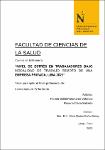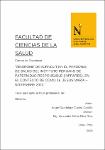| dc.contributor.advisor | Balbin Ramos, Wesly Rudy | |
| dc.contributor.author | Gomez Iquira, Mireya Evelina | |
| dc.date.accessioned | 2024-08-15T21:43:22Z | |
| dc.date.available | 2024-08-15T21:43:22Z | |
| dc.date.issued | 2024-06-25 | |
| dc.identifier.citation | Gomez, M. E. (2024). Condiciones de trabajo remoto y estrés laboral en colaboradores del área de Reclutamiento de empresas outsourcing e intermediación de Lima durante la pandemia de COVID 19 [Tesis de maestría, Universidad Privada del Norte]. Repositorio de la Universidad Privada del Norte. https://hdl.handle.net/11537/37387 | es_PE |
| dc.identifier.other | 658.31422 GOME/C 2024 | es_PE |
| dc.identifier.uri | https://hdl.handle.net/11537/37387 | |
| dc.description.abstract | Por la pandemia por COVID 19, se implementó el teletrabajo o trabajo remoto. Como consecuencia, muchos trabajadores presentaron dificultades y limitaciones en las condiciones para desarrollar el trabajo remoto. Esto generó que se empiece a evidenciar un desequilibrio en las emociones de los trabajadores, como la presencia de estrés laboral. Por ello, el objetivo principal es determinar la relación que existe entre las condiciones de trabajo remoto y estrés laboral en colaboradores del área de reclutamiento de empresas outsourcing e intermediación de Lima durante la pandemia de COVID 19. La metodología es de diseño correlacional, se trabajó con 152 colaboradores y se les aplicó los instrumentos Cuestionario de Condiciones de trabajo, seguridad y salud de Perú-CENSOPAS/INS y la Escala de estrés laboral de la OIT-OMS. Los resultados principales indican no existe un nivel con mayor predominancia para estrés laboral, porque todos los niveles (bajo estrés, medio-bajo estrés, medio-alto estrés y alto estrés) han sacado un porcentaje de 25%, por otro lado, el nivel bueno es el más frecuente para condiciones de trabajo remoto (28,6%). Se concluye que existe una relación negativa entre las variables en los colaboradores del área de reclutamiento de empresas outsourcing e intermediación de Lima durante la pandemia por COVID 19 (r=-0,146; p=0,012). | es_PE |
| dc.description.abstract | Due to the COVID 19 pandemic, teleworking or remote work was implemented. As a consequence, many workers presented difficulties and limitations in the conditions to develop remote work. This generated an imbalance in the emotions of the workers, such as the presence of work stress. Therefore, the main objective is to determine the relationship between remote work conditions and work stress in employees of outsourcing and intermediation companies in Lima during the COVID 19 pandemic. The methodology is of correlational design, we worked with 152 employees and applied the Peruvian Working Conditions, Safety and Health Questionnaire-CENSOPAS/INS and the ILO-WHO Work Stress Scale. The main results indicate that there is no level with a higher predominance for work stress, because all levels (low stress, medium-low stress, medium-high stress and high stress) have a percentage of 25%, on the other hand, the good level is the most frequent for remote working conditions (28,6%). It is concluded that there is a negative relationship between the variables in the employees of outsourcing and intermediary companies in Lima during the COVID 19 pandemic (r=-0,146; p=0,012). | es_PE |
| dc.description.uri | Tesis | es_PE |
| dc.format | application/pdf | es_PE |
| dc.format | application/msword | es_PE |
| dc.language.iso | spa | es_PE |
| dc.publisher | Universidad Privada del Norte | es_PE |
| dc.rights | info:eu-repo/semantics/openAccess | es_PE |
| dc.rights | Atribución-NoComercial-CompartirIgual 3.0 Estados Unidos de América | * |
| dc.rights.uri | https://creativecommons.org/licenses/by-nc-sa/3.0/us/ | * |
| dc.source | Universidad Privada del Norte | es_PE |
| dc.source | Repositorio Institucional - UPN | es_PE |
| dc.subject | Teletrabajo | es_PE |
| dc.subject | Estrés laboral | es_PE |
| dc.subject | Empresas | es_PE |
| dc.subject | COVID- 19 | es_PE |
| dc.subject | Lima, Perú | es_PE |
| dc.title | Condiciones de trabajo remoto y estrés laboral en colaboradores del área de Reclutamiento de empresas outsourcing e intermediación de Lima durante la pandemia de COVID 19 | es_PE |
| dc.type | info:eu-repo/semantics/masterThesis | es_PE |
| thesis.degree.grantor | Universidad Privada del Norte. Escuela de Posgrado y Estudios Continuos | es_PE |
| thesis.degree.level | Maestro | es_PE |
| thesis.degree.discipline | Maestría en Dirección y Gestión del Talento Humano | es_PE |
| thesis.degree.name | Maestra en Dirección y Gestión del Talento Humano | es_PE |
| dc.publisher.country | PE | es_PE |
| dc.subject.ocde | https://purl.org/pe-repo/ocde/ford#5.01.00 | es_PE |
| thesis.degree.program | Posgrado | es_PE |
| dc.description.sede | Trujillo El Molino | es_PE |
| renati.advisor.dni | 41025643 | |
| renati.advisor.orcid | https://orcid.org/0000-0002-3454-7747 | es_PE |
| renati.author.dni | 42156980 | |
| renati.discipline | 418217 | es_PE |
| renati.juror | Flores Casafranca, Raul Alberto | |
| renati.juror | Garcia Saavedra, Jose Luis | |
| renati.juror | Montoya Ramirez, Cesar Augusto | |
| renati.level | http://purl.org/pe-repo/renati/level#maestro | es_PE |
| renati.type | http://purl.org/pe-repo/renati/type#tesis | es_PE |
| dc.relation.conformsto | 19% | es_PE |
| dc.description.lineadeinvestigacion | Desarrollo Sostenible y Gestión Empresarial | es_PE |
| dc.description.sublineadeinvestigacion | Comunicación en la empresa. Audiencias y opinión pública | es_PE |










